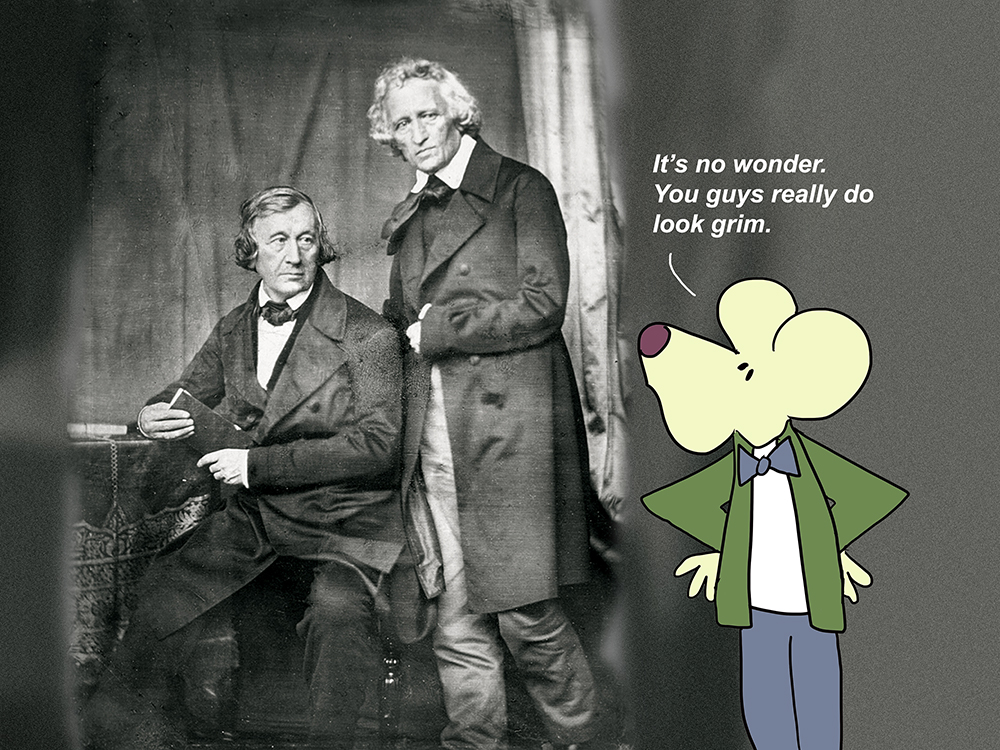Boy, oh boy. Do I ever love a good fairy tale. But it seems like fairy tales are seldomly about fairies. Or Faeries. Take for instance, a book that appeared first, on this date, December 20, in 1812. That is when “Grimm’s Fairy Tales” or “Children’s and Household Tales” by Jacob Grimm and Wilhelm Grimm was first published.
They included so many items in that work. The first edition contained 86 stories, and by the seventh edition in 1857, the work had 210 unique fairy tales. Little Red Riding Hood. Snow White and the Seven Dwarfs. Rumpelstiltskin. Rapunzel. Sleeping Beauty. The list goes on and on.
It makes me wonder just what kind of people could conjure up such magnificent stories, sans the faeries.
If you have a great interest, you can Google them separately and find quite a disparity between their Wiki-pages. Wilhelm has a few short paragraphs. Jacob has pages.
Oh, yes. Jacob and Wilhelm Grimm. They were born into a family of eight. Mother was Dorothea (née Zimmer). Father was Philipp Wilhelm Grimm.
Their good old dad Philipp was a highly regarded district magistrate in a place called “Steinau an der Straße.” This is about thirty miles from Hanau, which is right next to Frankfurt, smack dab in the middle of Germany.
Anyway, They were like two peas in a pod. They shared a room, a desk, even a bed for a long time. Both of them were hard-working in school, and both excelled. However, in 1796, their father died at the age of 44 from pneumonia. Jacob was born in 1785, Wilhelm in 1786. So these guys were young, young.
Of course, this was a tragic time for the Grimms in more ways than one. Not only did they lose their father, but they also lost all financial support. Apparently, they had to rely on their aunt, Henriette Zimmer, and grandfather, Johann Hermann Zimmer. Now, I don’t know about you, but whenever I have to ask my Aunt Henriette for anything, I shudder. I bet Jake and Will shuddered a lot.
As it turns out, Henriette sent them to a prestigious high school, Lyzeum, in Kassel, Germany. (That’s about 60 miles north of their home.) Both gramps, and auntie, stressed to them the need for them to do well in school. The grandfather even wrote them a long letter, expressing this need. No pressure kids, no pressure.
To make a long story short, they really wanted to live up to their deceased father’s reputation. They studied more than twelve hours a day and established similar work habits. At school, they shared the same bed and room, just as they did at home. Jacob graduated head of his class in 1802. Wilhelm got sick with asthma and scarlet fever, but one year later he was first in his class too. This all bode well for their “college” days. They followed their studies, working as librarians and professors. And, of course, writers.
But, for as much as they were the same, they were also very different. I cannot find that Jacob ever married. But, in 1825, 39-year-old Wilhelm married a pharmacist’s daughter named Henriette Dorothea Wild. They say Wilhelm’s marriage did not change the “harmony” of the brothers, as they both still lived under the same roof. I wonder how Henriette Wild felt about that.
Yet, Wilhelm’s character was a complete contrast to that of his brother. Jacob was driven, especially when it came to “linguistics.” Wilhelm stayed directly focused on his own studies, which were almost always of a literary nature. He also had a remarkable gift of story-telling and was an “uncommonly animated, jovial fellow.” Brother Jacob was more concerned with academia, and with working on his comprehensive dictionary. Though they never say so, I wonder if Wilhelm was the biggest contributor to the fairy tales.
So there it is. Wilhelm died first, in Berlin, in 1859, of an infection. Jacob died in 1863, in Berlin, from disease.
But along their way, they gave us a lot of good stories.
=============
“But how could you live and have no story to tell?”
― Fyodor Dostoevsky, White Nights
==============
“Some of these things are true and some of them lies. But they are all good stories.”
― Hilary Mantel, Wolf Hall
============
“Once upon a time…”
― The Brothers Grimm
============
The path to the tale with nary a fairy.
